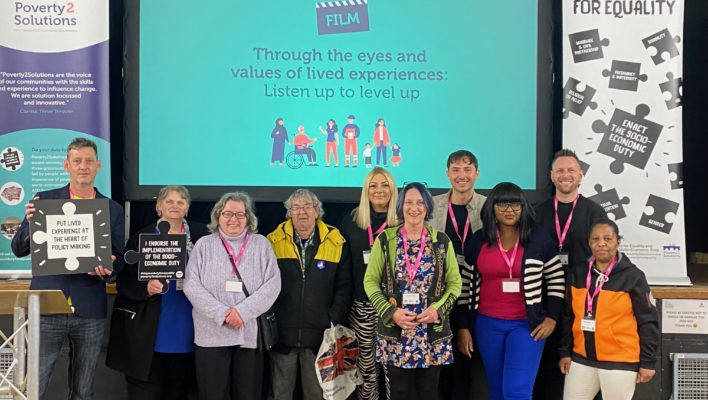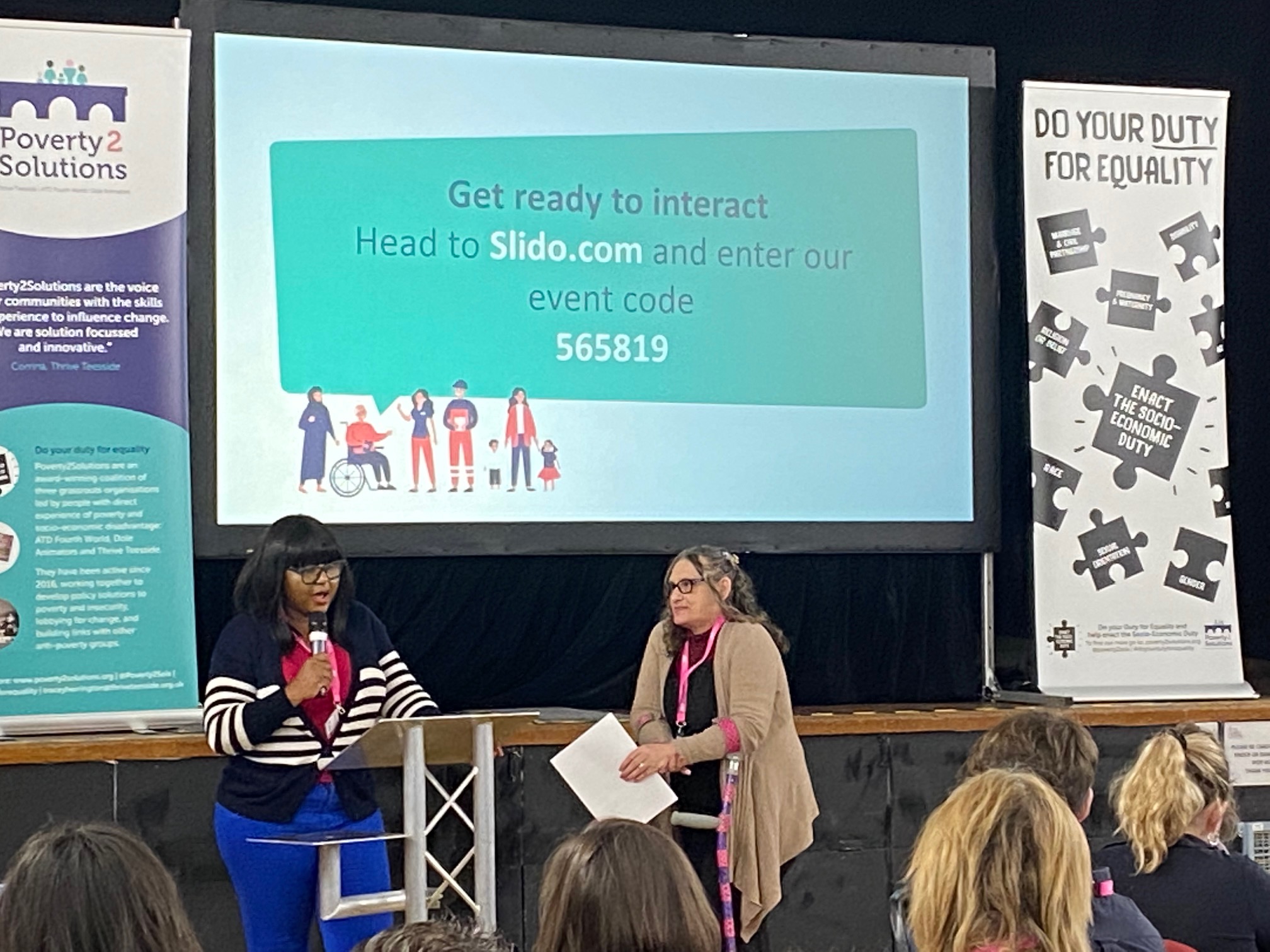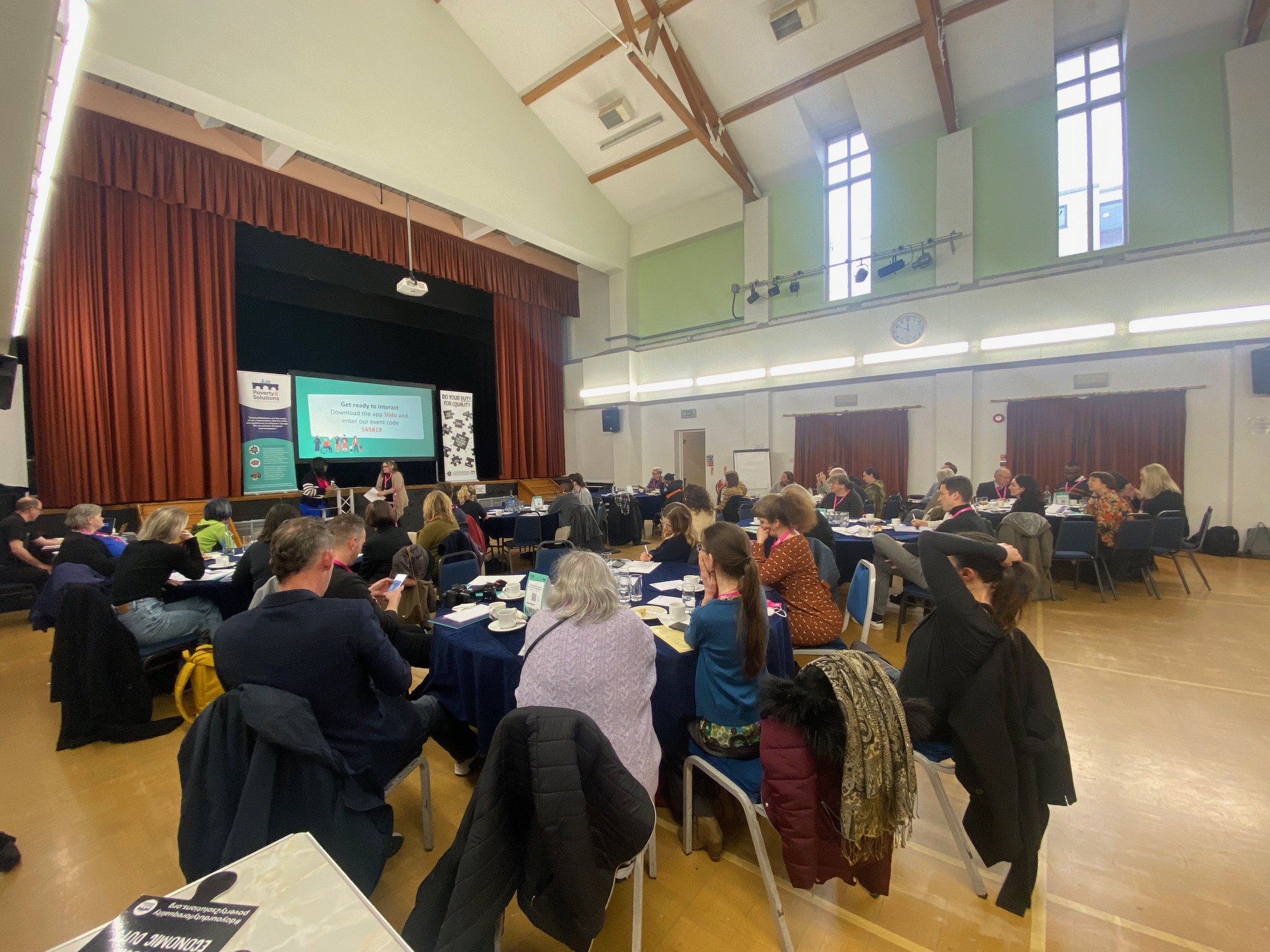Using lived experience of poverty to advocate for change

On 6 April 2022, the Joseph Rowntree Foundation organised a Westminster launch of the Poverty2Solutions film, ‘Through the eyes and values of lived experiences: Listen up to level up‘. Two lived experience activists from ATD, Lareine Mouoguia and Tammy Mayes, spoke to present an example of how their experience informs their advocacy.
Lareine: Good morning. My name is Lareine. I am part of Poverty2Solutions but also part of the Parents, Families and Allies Network, which we call “PFAN”.
Tammy: My name is Tammy Mayes and I’m the co-chair of PFAN.
Lareine: First, can you tell us what PFAN is?
Tammy: We are led by parents who have lived experience of child protection interventions. Our allies include social workers and social work academics. We believe that the current child protection system is oppressive. It doesn’t protect children and it undermines parents. Parents in poverty are judged severely and that is wrong. Poverty is not neglect!

Lareine: The government decided that the children’s social care system needed to be reviewed. Can you tell us about how PFAN has been communicating with the independent care review team?
Tammy: A year ago, we weren’t even sure it would be useful to talk to them because the government might not listen. And we still don’t know what will be in their final report.
But I feel that at the end of the day, you shouldn’t criticise if you haven’t put in the work yourself to try to influence policy decisions.
Lareine: You’re not closing your eyes and ears to people you disagree with. You’ve got to be in it to win it!
Tammy: Exactly! That’s why we’ve spent a year now having many conversations with them. It’s good we’re talking to them because Josh McAlister, the chair of the review, doesn’t have lived experience.
Lareine: Social services still don’t get the difference between poverty and neglect. They come in with a judgement against you. When you’ve been there, it can get really emotional. What has it been like talking to the review team?
Tammy: It can feel a bit funny when you’re talking about something traumatic. Once, I didn’t agree with what they were saying. But I was able to bring the conversation back to our main point. And I’ve always felt listened to.

Roles for parents; roles for allies
Lareine: How do you prepare before talking to the review team?
Tammy: We have a group just for parents. We need our own space with no judgement because some parents can’t speak up to tell people what they’re thinking. So we can be there for each other. Then the parents who can talk will take the points from the whole group to tell others what we’re all thinking.
Lareine: What about the allies in PFAN? What do they do?
Tammy: I know there are other groups where allies treat the people with lived experience in tokenistic ways. But PFAN is different. The allies believe that parents have the capacity to speak for ourselves. They have been there to help parents get our foot in the door to be able to speak to the review team. They also know that parents can be having really tough times and might need a break. They’re fighting for all parents to have a voice.
Lareine: So PFAN has been working on this for a year now and preparing a kind of shadow report. What is the situation now?
Tammy: In February, we published our own report on Children’s Social Care. It’s designed in a format that we knew would be useful for the review team. We made it as professional as possible, and we called our report “The Way Forward” because we see so many solutions to make things better.
Lareine: What kind of solutions?
Tammy: In some local authorities, parents who are dealing with child protection cases can be supported by a parent-to-parent advocate. We’re recommending that this be made mandatory in every local authority because it makes a huge difference to be supported by someone who has their own lived experience.
Lareine: I saw that the BBC and the British Association of Social Workers both took notice of PFAN’s report. That will make it hard for the care review team to ignore it! You are really flying high right now!
Tammy: The other day I got told that my confidence has grown so much, and my passion. It’s true. We’ve all got a story, and there’s so much we need to speak about. When the care review team report comes out, if we see that they haven’t listened to us enough, we might add to our own report. People with lived experience need their voices to be heard.
Lareine: Now before we stop, our job is to ask everyone here a question that we can discuss in small groups. We have heard Tammy talk about the challenge of working with people we might not agree with, and also about how people with lived experience and allies can work together in ways that are not tokenistic. I’d like to know, for others in this room:
When you have the chance to talk to people whose experience and views are different from yours, what do you need to feel able to contribute? What do you think helps to make this kind of conversation work well?

